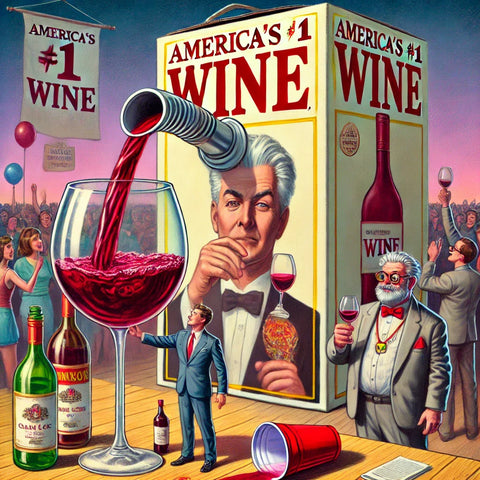Updated 9/11/25
The news has rippled through the wine world: LVMH, the god of luxury goods, is closing Newton Vineyard, a Napa Valley winery that once symbolized soaring ambition and cutting-edge winemaking. For a brand synonymous with prestige and quality, this decision raises eyebrows and begs the question: what led to the demise of a once-promising star?
Newton's story is one of dramatic highs and disappointing lows. Founded in 1991 by Su Hua Newton, the winery quickly gained acclaim for its bold, mountain-grown Cabernet Sauvignons. Central to this early success was the "Unfiltered" bottling, a wine that became a cult favorite and a symbol of Newton's pioneering spirit. This wasn't just a marketing gimmick; the Unfiltered wines were genuinely unfiltered, meaning they weren't subjected to the final filtration process that many wines undergo. This approach, at the time, was relatively unconventional and was intended to preserve the wine's natural flavors, textures, and complexity, allowing the terroir of the mountain vineyards to shine through. The striking, minimalist label, often featuring the word "Unfiltered" prominently, further reinforced the wine's distinctive character.
Newton offered several tiers within its portfolio. While Unfiltered was the flagship, they also produced other Cabernet Sauvignons from different vineyard blocks, often designated by specific names or vineyard designations. These wines, while still high-quality, didn't quite achieve the same level of cult status as the Unfiltered bottles. This focus on a multi-tiered portfolio, while common in Napa, may have inadvertently diluted the brand's core identity over time. Were they primarily known for Unfiltered, or were they trying to be everything to everyone?
LVMH acquired the estate in 2001, seemingly setting the stage for even greater heights. The resources and global reach of LVMH should have provided Newton with the platform to solidify its position as a top-tier Napa Cabernet producer. However, the trajectory took an unexpected turn.
So, where did it all go wrong? While official statements from the winery were frequently and predictably murky, several factors likely contributed to Newton's downfall:
- Changing Consumer Preferences: The market for high-end Cabernet Sauvignon has evolved. While Newton’s wines, especially the Unfiltered wines, were undeniably bold, some consumers began gravitating towards more elegant, restrained styles. Newton, perhaps, struggled to adapt to these shifting tastes. The bold, unfiltered style that initially set them apart may have become less appealing to a broader audience. Where is the marketing shifting? Italian varietals like Sangiovese and Nebbiolo are currently experiencing a resurgence for their subtlety.
- Price Point Competition: Napa Valley is a fiercely competitive landscape. Newton faced stiff competition from established wineries with long histories and newer, boutique producers offering compelling wines at various price points. Maintaining a competitive edge in this environment proved challenging, especially as consumer preferences shifted.
- Brand Identity Issues: While Unfiltered was a strong brand, Newton's overall identity may have become somewhat diluted over time. The expansion of the portfolio, while perhaps intended to capture different market segments, may have blurred the message. Were they the innovative producers of Unfiltered Cabernet, or something else?
- Production Challenges: Mountain vineyards, while capable of producing exceptional fruit, are notoriously difficult to farm. Yields are often lower, and the rugged terrain presents logistical challenges. These factors can contribute to higher production costs and potentially impact consistency, especially for a wine like Unfiltered where vintage variation could be more pronounced.
- LVMH Portfolio Strategy: LVMH owns a vast portfolio of luxury brands, including Armand de Brignac, Ruinart and Veuve Clicquot. It's possible that Newton no longer aligned with the company's overall strategic direction for its wine division that is almost exclusively a sparkling wine concern.
- The Ghost of Past Management: There have been reports of management and strategic conflicts at the winery over the years, which likely contributed to inconsistencies and a lack of clear vision. This is a common challenge for businesses including wineries.
- California Wildfires: The California wildfires that recently ravaged the Palisades community in the Santa Monica mountains of California destroyed Newton's winery in 2020. The fires almost wiped out all its vines. Initially, LVMH had plans to rebuild despite the staggering cost. Surely, the massive reconstruction costs along with all the other headwinds factored into LVMH's calculus to close.
The closure of Newton is a stark reminder that even with the backing of a luxury giant like LVMH, success in the wine industry is never guaranteed. It underscores the importance of adapting to changing market dynamics, maintaining a clear brand identity, and consistently delivering exceptional quality. In Newton's case, the very characteristic that made them famous – Unfiltered – may have ultimately contributed to their challenges in a changing market. The winery burning down did not help either.
Upon this initial report of the closure, the winery is now experiencing a rebirth. For further details, refer to my update.




코멘트 (0)
이 기사에는 댓글이 없습니다. 가장 먼저 메시지를 남겨보세요!